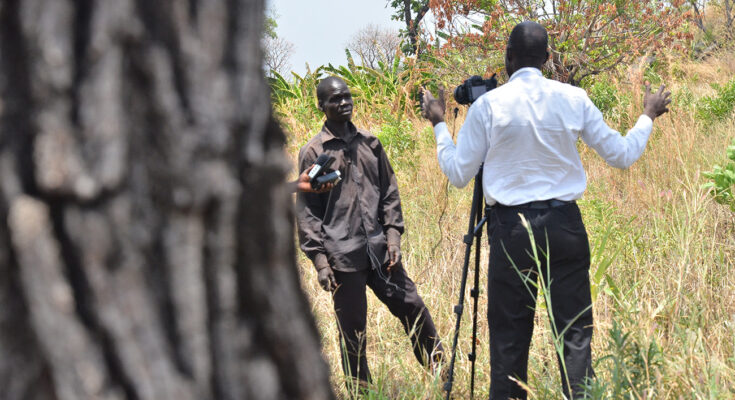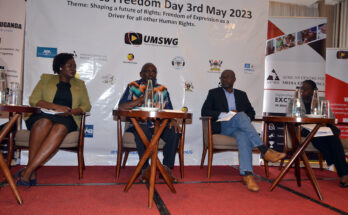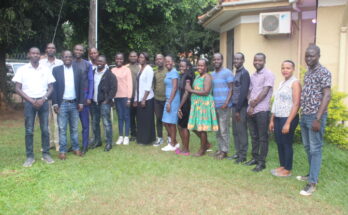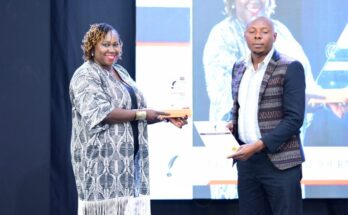PHOTO: Peter Labeja, a Vision Group journalist engaging with James Kidega at his rice farm in Mede parish in Gulu district
One of the cardinal roles of the mainstream media is to provide the public with accurate information. But oftentimes, the same platform fails to fulfill these obligations fully due to resource constraints. This gets even worse when newsrooms fail to report about issues happening in far-flung places where road networks are often poor, the internet is spotty, or when there is no power.
In rural northern Uganda for instance, climate change is a big concern. Agriculture is the major source of livelihood, comprising mainly of small-holder farmers who have to battle with some of the agricultural curses –long dry spells, erratic rains, devastating pests, and diseases – to grow food. And this gets harder by the day as they can no longer solely rely on indigenous knowledge to grow crops as they used to; now they are in dire need of smart farming techniques to adapt quickly to the negative effects of climate change.
Yet, despite mounting evidence of the negative effects of climate change here –and of course, globally – the mainstream media stream sometimes fails to give an accurate picture of what is happening right at the grassroots because most newsrooms here operate on shoestring budgets. And so, logistical challenges often get in the way of in-depth reporting.
In February this year, Northern Uganda Media Club (NUMEC) received a grant from WAN-IFRA and set out to address these issues by investigating how climate change is affecting small-holder farmers in the Acholi sub-region. As an organisation that has been fully committed to integrating the role of media for development in the war-scarred region for years, the issue of climate change is critical.
And so, we wanted to understand how climate change is manifesting itself here in Acholi sub-region; how it is affecting small-holder farmers right from the grassroots; and what kind of mitigation measures are being put in place by the same small-holder farmers to address it. We wanted to go beyond the daily news diet that usually portrays doom and gloom, by leaving out even the fledgling efforts from the local communities.
Equally important, we also wanted to do our reporting collaboratively. With this cooperative arrangement between media houses, we wanted to maximise both the resources we had at hand and made sure that content reached widely to our audience through various media platforms.
“What I liked about the [WAN-IFRA] project is the collaborative reporting bit. This innovative approach was the first of its kind in our newsroom because it helped to empower journalists up-country which gave them a chance to actively report well on how climate change was manifesting itself in our communities,” says Peter Labeja, a Programs Controller at Radio Rupiny who also benefited from the grant.
Allan Ochen, an editor at Mega F.M added that: “WAN-IFRA project helped a hand microphone to local farmers who were able to share their experience with the adverse effects of climate change on their work. After running the stories, we got a lot of public feedback where many lauded our content and confirmed that climate change causes were mostly man-made”.
It took us two weeks to complete everything, from fieldwork to production. Three radio stories were broadcast on three radio stations—Radio Rupiny and Mega F.M in Gulu city; Mighty Fire F.M in Kitgum district; and Wang oo in Agago district. And a web article was also published by both the Observer, a national newspaper, and then on the NUMEC website.
Rationale
Agriculture remains the backbone of Uganda’s economy, employing over 70 percent of the population. But this form of livelihood is also being threatened by climate change, characterized by erratic rains and sizzling temperatures, ranking the east African nation as the 12th most vulnerable to the crisis, globally. Our story brings to the fore voices of smallholder farmers and their struggles to adapt.




